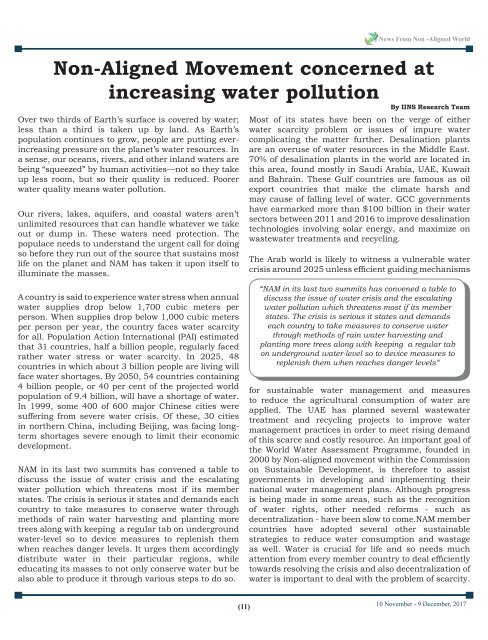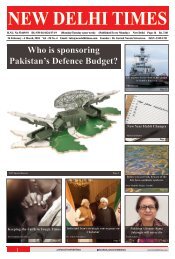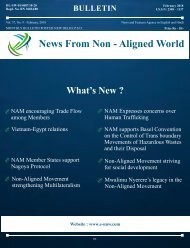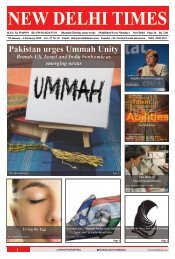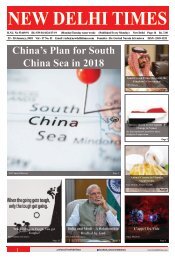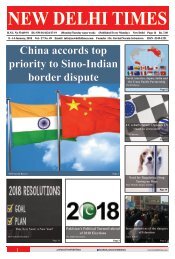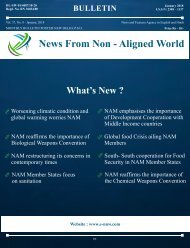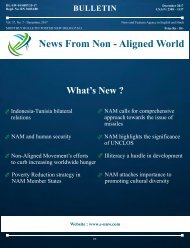10 november 2017_final
You also want an ePaper? Increase the reach of your titles
YUMPU automatically turns print PDFs into web optimized ePapers that Google loves.
Non-Aligned Movement concerned at<br />
increasing water pollution<br />
By IINS Research Team<br />
Over two thirds of Earth’s surface is covered by water;<br />
less than a third is taken up by land. As Earth’s<br />
population continues to grow, people are putting everincreasing<br />
pressure on the planet’s water resources. In<br />
a sense, our oceans, rivers, and other inland waters are<br />
being “squeezed” by human activities—not so they take<br />
up less room, but so their quality is reduced. Poorer<br />
water quality means water pollution.<br />
Our rivers, lakes, aquifers, and coastal waters aren’t<br />
unlimited resources that can handle whatever we take<br />
out or dump in. These waters need protection. The<br />
populace needs to understand the urgent call for doing<br />
so before they run out of the source that sustains most<br />
life on the planet and NAM has taken it upon itself to<br />
illuminate the masses.<br />
News From Non -Aligned World<br />
Most of its states have been on the verge of either<br />
water scarcity problem or issues of impure water<br />
complicating the matter further. Desalination plants<br />
are an overuse of water resources in the Middle East.<br />
70% of desalination plants in the world are located in<br />
this area, found mostly in Saudi Arabia, UAE, Kuwait<br />
and Bahrain. These Gulf countries are famous as oil<br />
export countries that make the climate harsh and<br />
may cause of falling level of water. GCC governments<br />
have earmarked more than $<strong>10</strong>0 billion in their water<br />
sectors between 2011 and 2016 to improve desalination<br />
technologies involving solar energy, and maximize on<br />
wastewater treatments and recycling.<br />
The Arab world is likely to witness a vulnerable water<br />
crisis around 2025 unless efficient guiding mechanisms<br />
A country is said to experience water stress when annual<br />
water supplies drop below 1,700 cubic meters per<br />
person. When supplies drop below 1,000 cubic meters<br />
per person per year, the country faces water scarcity<br />
for all. Population Action International (PAI) estimated<br />
that 31 countries, half a billion people, regularly faced<br />
rather water stress or water scarcity. In 2025, 48<br />
countries in which about 3 billion people are living will<br />
face water shortages. By 2050, 54 countries containing<br />
4 billion people, or 40 per cent of the projected world<br />
population of 9.4 billion, will have a shortage of water.<br />
In 1999, some 400 of 600 major Chinese cities were<br />
suffering from severe water crisis. Of these, 30 cities<br />
in northern China, including Beijing, was facing longterm<br />
shortages severe enough to limit their economic<br />
development.<br />
NAM in its last two summits has convened a table to<br />
discuss the issue of water crisis and the escalating<br />
water pollution which threatens most if its member<br />
states. The crisis is serious it states and demands each<br />
country to take measures to conserve water through<br />
methods of rain water harvesting and planting more<br />
trees along with keeping a regular tab on underground<br />
water-level so to device measures to replenish them<br />
when reaches danger levels. It urges them accordingly<br />
distribute water in their particular regions, while<br />
educating its masses to not only conserve water but be<br />
also able to produce it through various steps to do so.<br />
“NAM in its last two summits has convened a table to<br />
discuss the issue of water crisis and the escalating<br />
water pollution which threatens most if its member<br />
states. The crisis is serious it states and demands<br />
each country to take measures to conserve water<br />
through methods of rain water harvesting and<br />
planting more trees along with keeping a regular tab<br />
on underground water-level so to device measures to<br />
replenish them when reaches danger levels”<br />
for sustainable water management and measures<br />
to reduce the agricultural consumption of water are<br />
applied. The UAE has planned several wastewater<br />
treatment and recycling projects to improve water<br />
management practices in order to meet rising demand<br />
of this scarce and costly resource. An important goal of<br />
the World Water Assessment Programme, founded in<br />
2000 by Non-aligned movement within the Commission<br />
on Sustainable Development, is therefore to assist<br />
governments in developing and implementing their<br />
national water management plans. Although progress<br />
is being made in some areas, such as the recognition<br />
of water rights, other needed reforms - such as<br />
decentralization - have been slow to come.NAM member<br />
countries have adopted several other sustainable<br />
strategies to reduce water consumption and wastage<br />
as well. Water is crucial for life and so needs much<br />
attention from every member country to deal efficiently<br />
towards resolving the crisis and also decentralization of<br />
water is important to deal with the problem of scarcity.<br />
(11)<br />
<strong>10</strong> November - 9 December, <strong>2017</strong>


